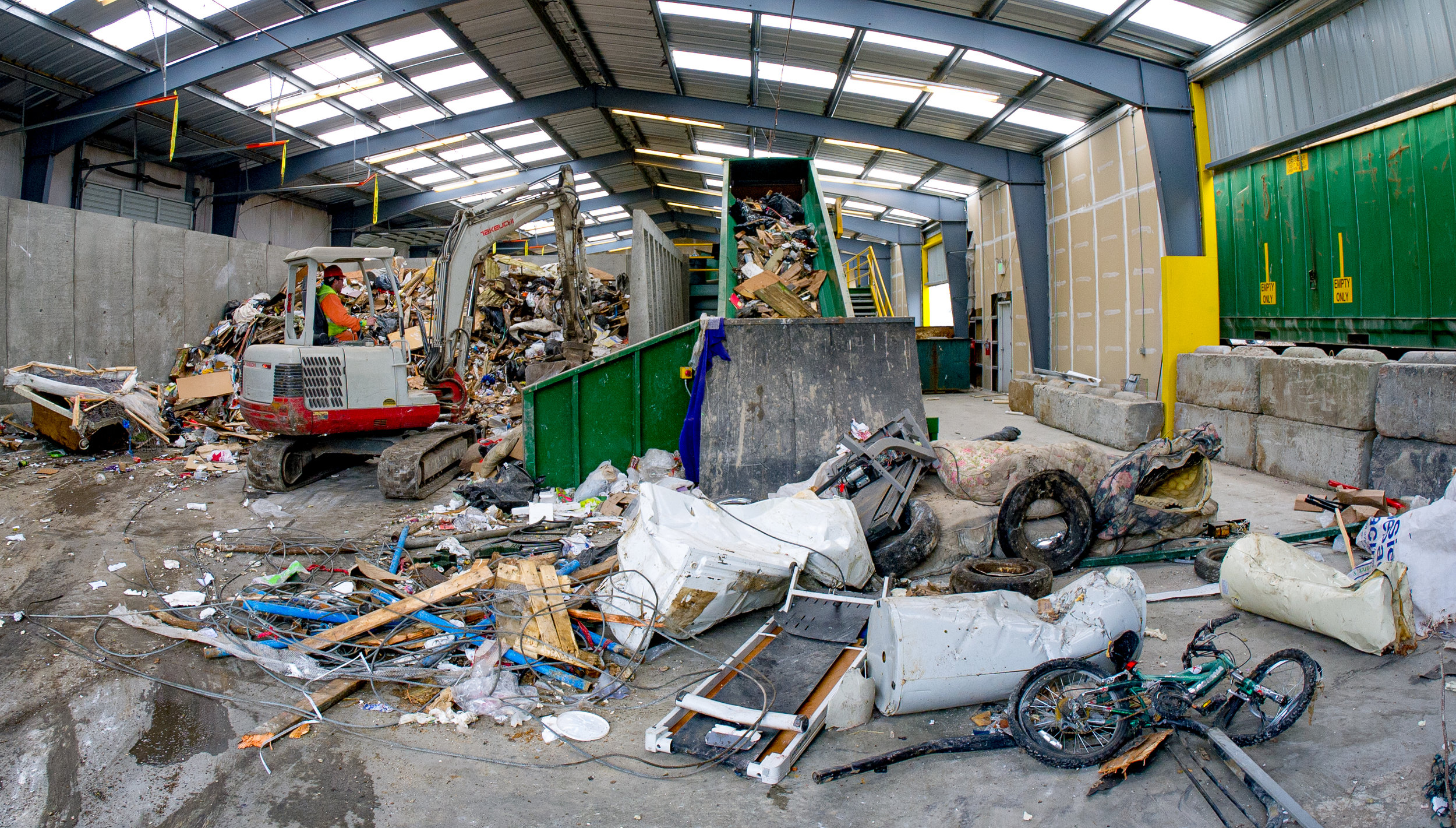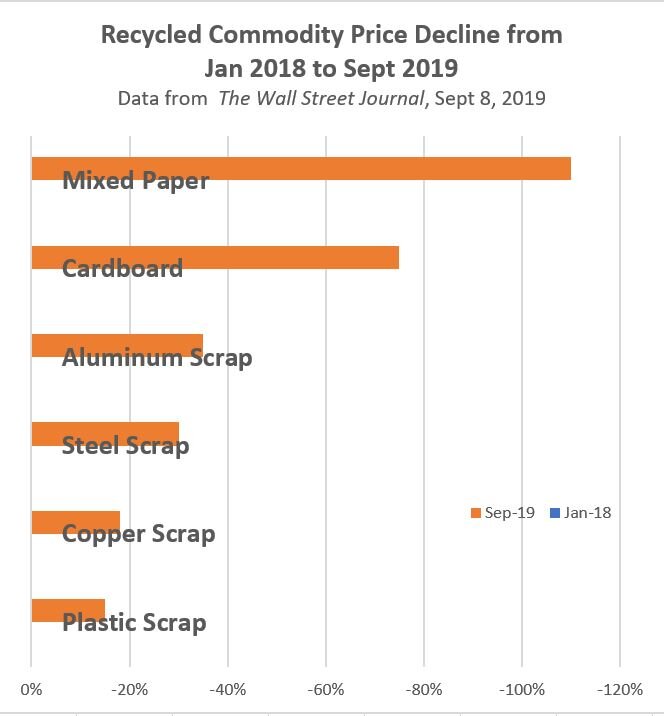
World Recycling Trends
Above photo is of RDS staff sorting through garbage for material that can be salvaged for recycling. As of 2024, RDS continues to evaluate how best to recycle material.
Since 2018, the cost of recycling has skyrocketed
WHY?
The biggest buyer of recycling in America had been China, but in January 2018, they stopped accepting American recyclable material, causing cities and counties across the United States to stop or reduce their recycling efforts.
Since then, the overall recycling rate in the United States has been declining. According to the EPA, the recycling rate (including composting) dropped from 34.7% in 2015 to 32.1% in 2018. This decline indicates ongoing challenges in the recycling system. As of 2021, rates continue around 35%. (More recent numbers are hard to track down.)
Examples include:
Deltona in Florida ended their curbside recycling program
Memphis Airport still has recycling bins but sends all the collections to landfills
Philadelphia is now burning over half of their recyclables
In states like Tennessee, Florida, and Pennsylvania, cities are reportedly sending newspapers, cans, and bottles to landfills
Economic Challenges
Many municipalities and local transfer stations, like RDS, are facing economic pressures related to recycling:
Increased costs: After China's 2018 ban on importing certain recyclables, many U.S. cities have had to pay more to process recyclables or even to dispose of them.
Revenue loss: Some cities that previously earned money from selling recyclables now have to pay for their removal. RDS constantly searches for viable use of recyclable materials.
Shifting Focus to Quality
There's an increasing emphasis on improving the quality of recyclables:
Contamination reduction: Many transfer stations are working to reduce contamination in recycling streams to make materials more marketable. RDS has multiple locations at our site to help separate various recyclable materials.
RDS STILL SUPPORTS RECYCLING
RDS is the locally owned solid waste transfer station that is committed to the community.
We get no government assistance to handle recycling. During this tough economic environment for recyclables, we continued to accept recyclable materials.
However, the costs are burdensome, and we charge a minimal flat fee of $15 for household recyclables up to 200 pounds. This still does not cover all of our costs, but it helps us to continue to support local recycling by keeping our program open to all.
RDS does not send your recycled material to the landfill. Instead, we pay money to various local recycling companies to reuse the collected material responsibly.
The companies we use include (but are not limited to):
Northwest Recycling: https://nwrecycling.com/
Z's Recycling: https://zrecyclers.com/
If you want to read more, check out these stories on the state of recycling:
February 2021: 74 recycling facts + statistics - https://www.rts.com/blog/recycling-facts-statistics/
March 2020: Recycling in the U.S. Is Broken. How Do We Fix It? From Columbia Climate School. - https://news.climate.columbia.edu/2020/03/13/fix-recycling-america/
August 2019: U.S. Recycling Industry Is Struggling To Figure Out A Future Without China - https://www.npr.org/2019/08/20/750864036/u-s-recycling-industry-is-struggling-to-figure-out-a-future-without-china
August 2019: More U.S. Towns Are Feeling The Pinch As Recycling Becomes Costlier - https://www.npr.org/2019/08/21/751524877/more-u-s-towns-are-feeling-the-pinch-as-recycling-becomes-costlier
As Costs Skyrocket, More U.S. Cities Stop Recycling – New York Times: https://www.nytimes.com/2019/03/16/business/local-recycling-costs.html
The World's Recycling Is In Chaos. Here's What Has To Happen – Wired Magazine: https://www.wired.com/story/the-worlds-recycling-is-in-chaos-heres-what-has-to-happen/
'Moment Of Reckoning': US Cities Burn Recyclables After China Bans Imports – The Guardian: https://www.theguardian.com/cities/2019/feb/21/philadelphia-covanta-incinerator-recyclables-china-ban-imports
Nationwide, Communities Are Discontinuing Recycling Programs – Salon: https://www.salon.com/2019/01/26/nationwide-communities-are-discontinuing-recycling-programs_partner/
And from WasteDive.com, who evaluates the impact to each of the fifty states.
https://www.wastedive.com/news/what-chinese-import-policies-mean-for-all-50-states/510751/.
Here are the highlights for the state of Washington from WasteDive.com:
Washington State Effect: HEAVY
The state's Department of Ecology said China's policies were "beginning to create a major disruption" as early as the fall of 2017, and warned that slower processing rates could lead to disposal. The agency asked local governments to avoid permanent changes. In the months since, news began to leak out slowly about mostly small municipalities experiencing issues - but nothing on the magnitude of neighboring Oregon.
Then Ecology hosted its first statewide recycling market call on March 28, during which it became apparent that effects were worse than previously reported. In April 2018, the Washington Utilities and Transportation Commission (UTC) told Waste Dive it was now allowing companies to request rate changes more frequently than in the past and expected all 53 regulated haulers to make a request if they haven't already. Ecology released new guidance on commingled programs in July, including a template for accepted material lists.
The Washington Refuse and Recycling Association has also been updating guidance for members about the basics of China's import policies and how they can respond.
Side Effects
The Seattle Times reports Republic Services had been asking for temporary mixed paper disposal permission from dozens of King County municipalities. (March 2018)
Multiple stories, including NBC Nightly News and Q13 Fox eventually show that Republic got approval from everyone except Seattle and King County. Yet the company still included King County's mixed paper anyway as part of a broader 2,000 ton disposal. (April-July 2018)
McClatchy takes a deep look at statewide conditions, including education efforts from the Department of Ecology and rising costs for Tacoma. (July 2018)
Spokane has been paying Waste Management as much as $60,000 per month recently for recycling service, according to The Spokesman-Review. Meanwhile, the article reports that Inland Empire Paper is reducing its consumption of recycled feedstock due to ongoing contamination issues. The Yakim Herald reports that Yakima Waste Systems is now charging the same price for recycling as for waste. (Oct. 2018)
The Bellingham Herald reports that Northwest Recycling has faced some challenges with stockpiling recently, but is still finding homes for material from Whatcom County. (Oct. 2018)
The New Tribune reports that Tacoma is weighing four possible options for the future of its recycling program, all of which will come with a higher cost. Those choices range from ending curbside service in its current form to expanding the program to also include more education and drop-off sites. The paper reports that recycling currently costs the city about $100 per ton. (March 2019)
Pierce County will no longer accept cartons, shredded paper or plastic plant pots in curbside or drop-off recycling, according to a county release. This does not affect some larger municipalities in the county, such as Tacoma. (May 2019)
Arlington approves a rate increase for customers serviced by Waste Management, and is re-emphasizing education, according to The Marysville Globe. (Dec. 2018)
Yakima-based Central Washington Recycling will stop accepting aluminum, tin and plastic as of Feb. 2019 according to the Yakima Herald. Richland residents will soon see curbside rates goes up, per KEPR. The state's Department of Ecology is backing new legislation that would create a market development incubator and require statewide development of contamination reduction plans. (Jan. 2019)
